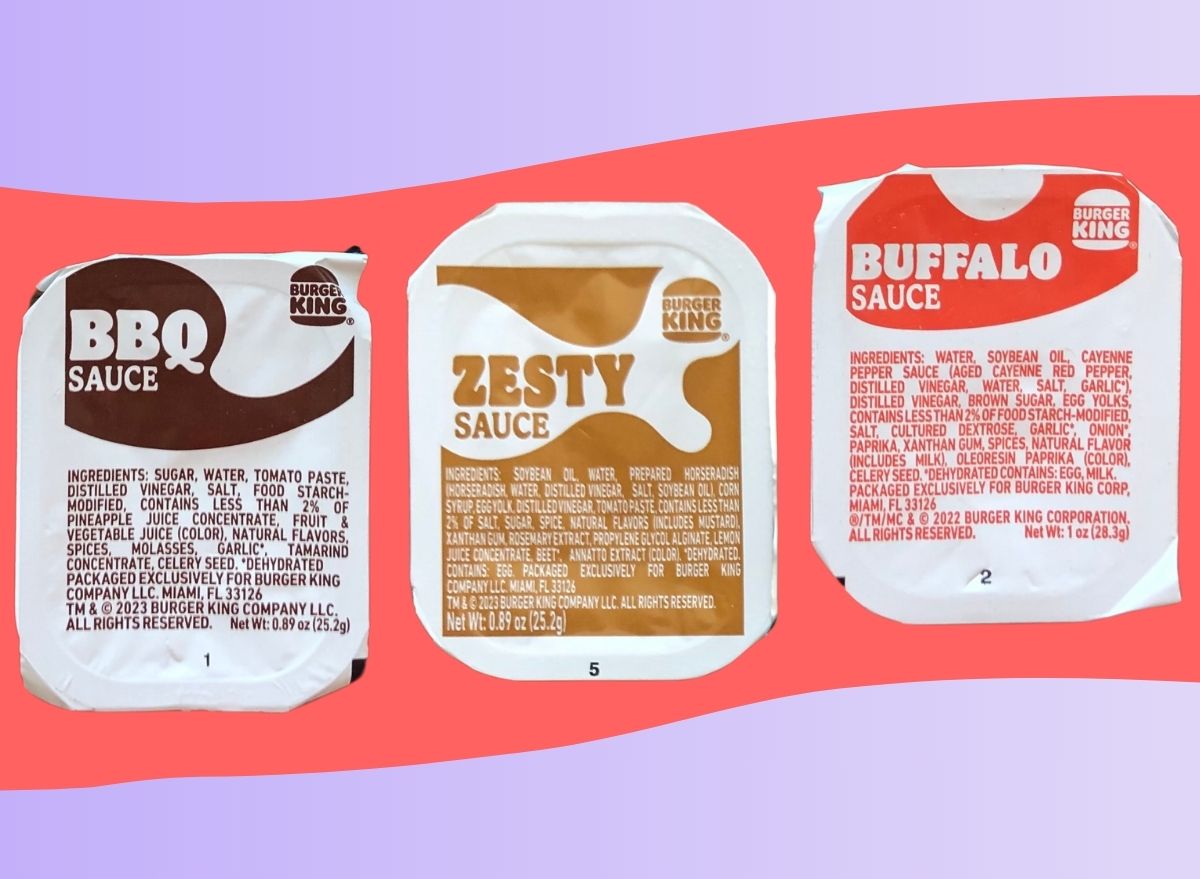The product recommendations in this post are recommendations by the writer and/or expert(s) interviewed and do not contain affiliate links. Meaning: If you use these links to buy something, we will not earn a commission.
There are countless reasons why you may choose to eat at one fast-food joint over another. The specific kind of food obviously plays a big role in that decision. Will you pick up burgers and milkshakes? Maybe sandwiches or chicken? Or, have a mid-week fiesta with some tacos?
But, what about dipping sauces? Could something as small and insignificant really dictate where you dine? Well, in my experience, the answer is a resounding “yes.” I firmly believe that a good dipping sauce can transform a meal, and it can be the deciding factor in where I go to eat. For instance, my obsession with Raising Cane’s is based around its famous signature sauce. A Crunchwrap from Taco Bell wouldn’t be the same without a crafty sauce packet, and if you smothered anything in Arby’s sauce, I bet it would taste delicious.
However, if I had to pick one establishment whose sauce game was a complete mystery to me, it would be Burger King. Naturally, I made it my mission to find out what I may or may not be missing by trying all six of the chain’s sauces at once. These include barbecue, Buffalo, honey mustard, ranch, sweet and sour, and “zesty”—a lineup sneakily similar to the King’s largest competitor, McDonald’s.
I used an order of chicken fries—a neutral yet delicious tool—as my scooping mechanism and judged each sauce as objectively as possible. Here are my final saucy results, from my least to most favorite.
Zesty Sauce
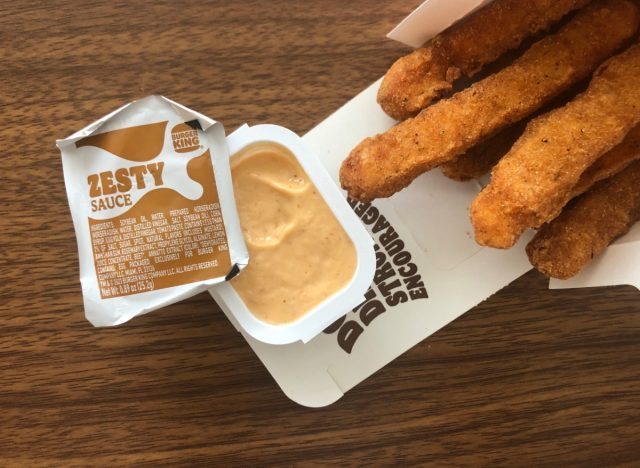
Nutrition (Per Packet):
Calories: 153
Fat: 15.6 g (Saturated Fat: 2.5 g)
Sodium: 230.8 mg
Carbs: 2.9 g (Fiber: 0.2 g, Sugar: 1.4 g)
Protein: 0.3 g
In my mind, the word zesty can take on many different meanings. So, I wasn’t sure what to expect from this signature Burger King sauce. Would it take a more literal approach with the inclusion of citrus fruit zest? Maybe it would be spicy instead, packing a piquant punch? I deliberately didn’t check the sauce label ahead of time, so it could be a surprise as I peeled back the film.
The look: Creamy and thick in a shade of light orange. It appears to be ranch or mayo-based with some darker speckles. This is the look of a sauce I expect to accompany my fries at a hip new gastropub.
The taste: It didn’t take me long to pinpoint this sauce’s main ingredient: horseradish and more horseradish. All other flavors—including tomato paste, lemon juice concentrate, sugar, spices, and natural flavors like mustard—are masked by its overbearing presence. I wouldn’t quite call it spicy. But, it has a pungency that covers your entire tongue and a bitter sourness, presumably from the added vinegar.
Unfortunately, the only thing on the BK menu this might pair well with is the onion rings or one of its Big Fish sandwiches. I would rather skip it altogether.
Ranch Sauce
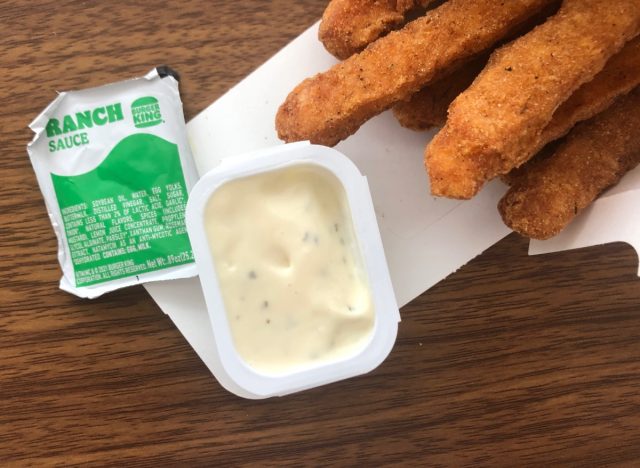
Nutrition (Per Packet):
Calories: 135
Fat: 14.3 g (Saturated Fat: 2.3 g)
Sodium: 253 mg
Carbs: 1.1 g (Fiber: 0.1 g, Sugar: 0.8 g)
Protein: 0.7 g
Failing to add ranch to a restaurant menu is a grave offense–especially here in the Midwest. Folks around the region (and beyond) worship the buttermilk-based blend and slather it on anything and everything from fries and hot wings to pizza and potato skins. Luckily, we can all breathe a sweet sigh of relief because Burger King offers its own version of the condiment—just like any other respectable fast-food chain should.
The look: Heavier and gloopier than most ranches I’ve seen. But it comes in a promising shade of off-white with green herb flakes sprinkled in to give it some character.
The taste: If you’re a true ranch lover, you know that each one tastes just a bit different from the next. I can usually appreciate them all, but not this time. The substance is between a veggie dip and a normal ranch, but with an acidic bite that never lets up. It almost has a dill or pickled taste, which would typically make sense, except that dill doesn’t appear on the ingredient list—unless it’s covered by the mention of generic spices.
I would dip nuggets or fries in it, if the option were this or nothing. But, when compared to ranch greats like Wingstop or McDonald’s, this one certainly falls to the bottom of the barrel.
Sweet & Sour Sauce
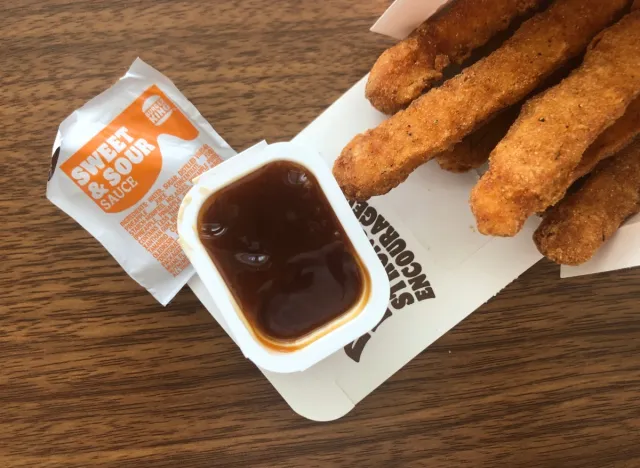
Nutrition (Per Packet):
Calories: 461.1
Fat: 0.2 g (Saturated Fat: 0 g)
Sodium: 50.9 mg
Carbs: 10.9 g (Fiber: 0.1 g, Sugar: 9.8 g)
Protein: 0.1 g
For those who want the best of both worlds, Burger King offers a sweet and sour sauce. It’s a standard choice carried by most burger- or chicken-slinging fast-food restaurants. It also brings an Asian flair to a menu that’s considered purely American. There are many ways to make sweet and sour sauce, though most start with either vinegar or soy sauce—or a combination of both—with a sweetness from sugar or fruit juice. Burger King, of course, follows its special recipe.
The look: Much darker in person than what’s portrayed on the website. On the menu, it’s an opaque caramel color. But, in my cup, I found a much darker substance reminiscent of brown gravy with a red tint.
The taste: Sweet, but not very sour. It’s made with pineapple juice, pineapple purée, and apricot purée—flavors I can pick out and give it a distinctive fruitiness. But, the rest is almost watery, despite its viscous consistency, with just a mild tang. This—plus the lack of Asian influence in ingredients—makes this one sauce I could take or leave.
Buffalo Sauce
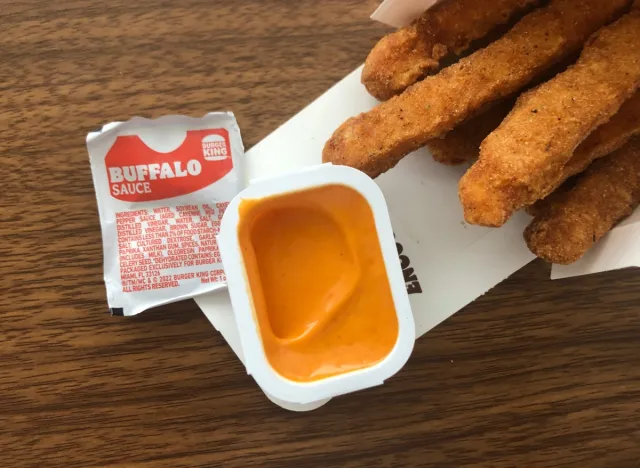
Nutrition (Per Packet):
Calories: 82.7
Fat: 8.2 g (Saturated Fat: 1.3 g)
Sodium: 366 mg
Carbs: 2.1 g (Fiber: 0.2 g, Sugar: 1.1 g)
Protein: 0.2 g
To be clear, Buffalo sauce and hot sauce are not the same. Buffalo sauce—which coats chicken wings and comes as a dip—is a hot sauce that has been doctored with butter and other ingredients such as paprika. These additions make it richer and creamier, and it’s what you’ll find on the BK menu.
The look: Fluorescent orange. Its bold hue makes a statement and warns to proceed with caution. In terms of consistency, it’s on the denser side and adheres well to whatever you dip into it.
The taste: Tame. I didn’t find it spicy at all, and I tend to play it safe when it comes to heat. If anything, I’d say it’s more acidic—likely the vinegar at work. Otherwise, there is some good flavor, almost like a smoother Frank’s RedHot. Even though it’s not a knockout, I would gladly use it to liven up an order of nuggets or a juicy chicken sandwich.
Honey Mustard Sauce
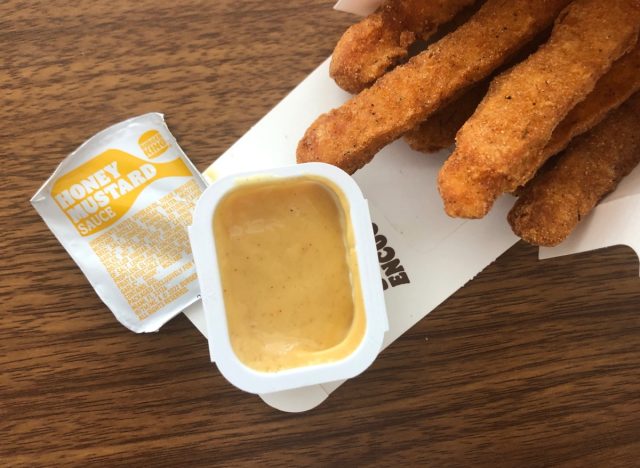
Nutrition (Per Packet):
Calories: 89
Fat: 6.3 g (Saturated Fat: 1 g)
Sodium: 173.1 mg
Carbs: 8.1 g (Fiber: 0.2 g, Sugar: 7.7 g)
Protein: 0.3 g
If you’re not a fan of mustard’s strong tang and slightly bitter taste, then honey mustard is a great alternative. It takes everything good about the condiment and spins it to be smoother and sweeter—making it a great buddy for salty, greasy fries or chicken tenders. I gravitate towards Chick-fil-A’s honey mustard recipe, but I was excited to try Burger King’s for the first time.
The look: A deep sunflower yellow color, spotted with what looks to be mustard and celery seeds. It appears thick-set and stagnant in the cup, but it’s more watery and oozy when something is dipped into it.
The taste: It has an undeniably powerful smell that made my nose scrunch, but it isn’t nearly as in-your-face. It’s almost like a reverse Sour Patch Kid. First, it’s sweet, and then, on the back end, you get a subtle pungency and kick from the mustard and a touch of hot sauce made up of cayenne pepper, vinegar, and salt. In my opinion, the flavor is tasty and had me coming back for more. But I wouldn’t say it’s the best honey mustard I have ever tasted.
BBQ Sauce
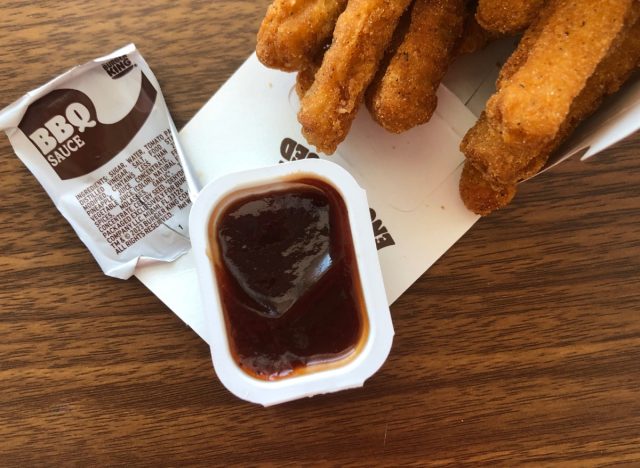
Nutrition (Per Packet):
Calories: 50
Fat: 0 g (Saturated Fat: 0 g)
Sodium: 310 mg
Carbs: 12 g (Fiber: 0 g, Sugar: 11 g)
Protein: 0 g
When all other sauces fail, or you’re struggling to make a saucy decision, barbecue is a trusty fallback. It has never been my first choice when presented with an array of options, but I don’t think I’ve had one that I disliked or couldn’t enjoy. It’s a true workhorse and a highly versatile sauce that goes well with almost any meat or poultry. I hoped the King’s version would live up to these sky-high expectations.
The look: Dark chestnut brown with a glossy finish. It’s the most concentrated sauce and remains unmoving in the small plastic container.
The taste: Somewhere in between sweet and savory with a touch of smokiness. With molasses added in, it’s a little sticky, too, and the ingredient gives it an added dose of pizzazz. It’s a classic rendition that could easily accompany anything on the Burger King menu, from its burgers and chicken nuggets to french fries and onion rings. I may have even saved some to keep here at home, just in case some dipping emergency arises. That’s how you know it’s good.

